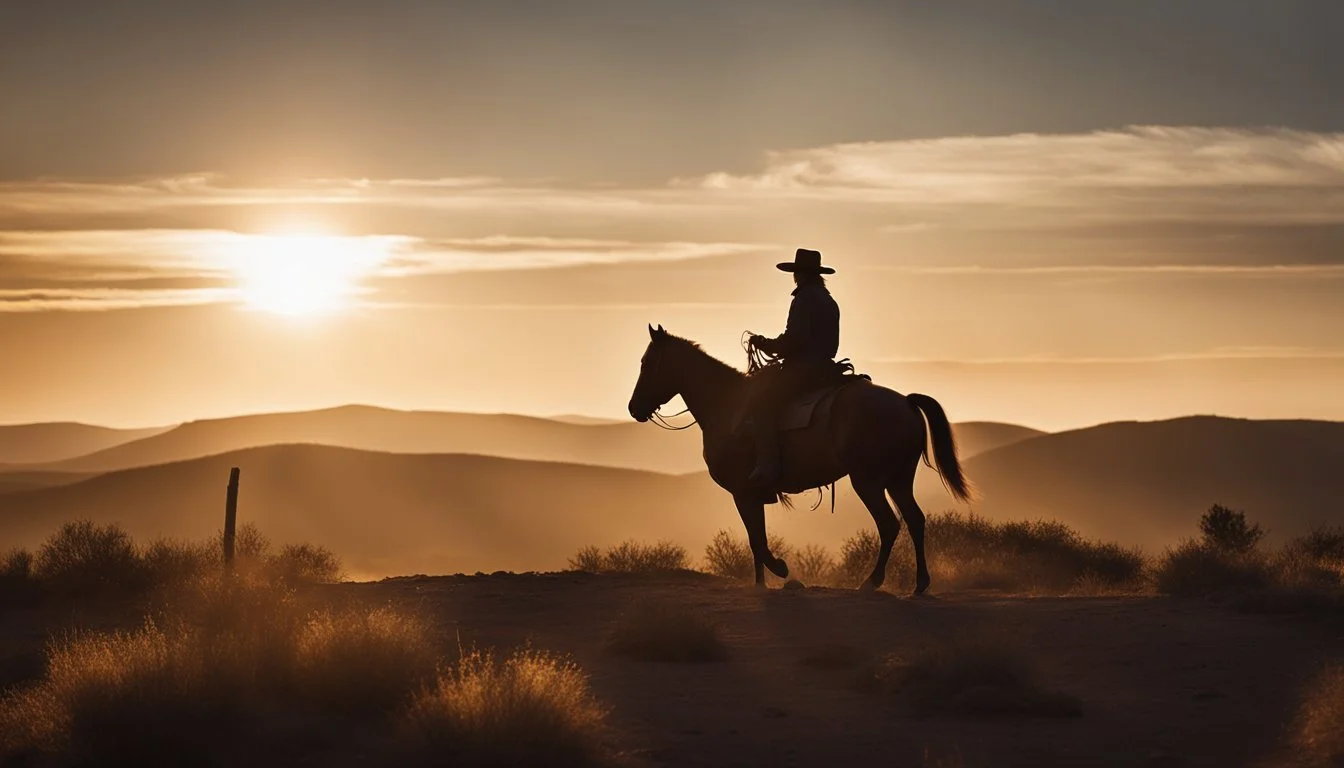4 Fascinating Films About Bass Reeves
The Real Lone Ranger - Exploring the Life of a Legendary Lawman
Bass Reeves, a former slave turned lawman, left an indelible mark on American history. His extraordinary life as a Deputy U.S. Marshal in the Wild West has captivated audiences and inspired filmmakers to bring his story to the screen.
Several films have portrayed Bass Reeves, shedding light on his role as a pioneering African American lawman and his possible connection to the iconic Lone Ranger character. These cinematic depictions offer viewers a glimpse into Reeves' remarkable journey from slavery to becoming one of the most effective lawmen in the American West.
1) The Cherokee Kid (1996)
The Cherokee Kid is a Western comedy film starring Sinbad as Isaiah Turner, a young man seeking revenge for his parents' murder. While not directly about Bass Reeves, the movie features James Pickens Jr. portraying the legendary lawman in a supporting role.
Set in the late 19th century, the film follows Isaiah's journey as he transforms from an inexperienced city dweller into a skilled gunslinger known as the Cherokee Kid. Bass Reeves appears as a mentor figure, offering guidance and wisdom to the protagonist.
Though primarily a comedic take on Western tropes, The Cherokee Kid provides a brief glimpse into Bass Reeves' character. It showcases his reputation as a respected lawman and his role in shaping the American frontier.
The movie, while not historically accurate, helps introduce Bass Reeves to a wider audience. It presents him as a figure of authority and justice in the Old West, aligning with his real-life accomplishments as a deputy U.S. marshal.
More information about The Cherokee Kid (1996)
2) Bass Reeves: The Real Lone Ranger (2010)
This documentary explores the life of Bass Reeves, a former slave who became one of the most successful lawmen in American history. Directed by Kevin R. Hershberger, the film presents compelling evidence that Reeves may have been the inspiration for the fictional Lone Ranger character.
The documentary features narration by Bill O'Reilly and dramatic reenactments with Dermot Mulroney. It covers Reeves' remarkable career as a deputy U.S. marshal in the Indian Territory, highlighting his bravery, marksmanship, and dedication to justice.
Viewers learn about Reeves' numerous arrests and his reputation for always getting his man. The film also delves into his use of disguises and his silver badge, drawing parallels to the iconic Lone Ranger.
Through interviews with historians and archival materials, the documentary makes a compelling case for Reeves as the real-life basis for the legendary masked hero. It sheds light on a often-overlooked figure in Western history.
IMDb: Bass Reeves: The Real Lone Ranger
3) Hell on the Border (2019)
Hell on the Border offers a cinematic portrayal of Bass Reeves' journey to becoming the first Black deputy U.S. Marshal west of the Mississippi River. The film is set in Arkansas in 1875 and follows Reeves as he navigates the challenges of law enforcement in the post-Civil War era.
Directed by Wes Miller, the movie stars David Gyasi as Bass Reeves, with Ron Perlman and Frank Grillo in supporting roles. The narrative focuses on Reeves' early career, depicting his pursuit of dangerous outlaws in Indian Territory.
The film highlights Reeves' exceptional skills as a lawman, showcasing his ability to track criminals and his proficiency with firearms. It also explores the racial tensions and prejudices he faced as a Black man in a position of authority during this period.
Hell on the Border aims to bring attention to Reeves' often overlooked contributions to American history. The movie blends action sequences with historical elements to create an engaging portrayal of this pioneering figure.
More information on Hell on the Border (IMDb)
4) Bass Reeves: National Lawman (2019)
Bass Reeves: National Lawman is a documentary that explores the life and legacy of the legendary lawman. The film, directed by Michael Cory Davis, presents a comprehensive look at Reeves' remarkable career.
The documentary features interviews with historians and experts who provide insights into Reeves' role as a U.S. Marshal. It highlights his exceptional skills as a detective and his unwavering commitment to justice in the Wild West.
Bass Reeves: National Lawman examines the challenges Reeves faced as a Black lawman in post-Civil War America. The film portrays his bravery and determination in overcoming racial barriers to become one of the most effective lawmen of his time.
Through historical reenactments and archival footage, the documentary brings Reeves' story to life. It showcases his numerous arrests and his reputation for fairness and integrity in enforcing the law.
The film also explores Reeves' influence on popular culture and his potential connection to the Lone Ranger character. It presents evidence and expert opinions on this intriguing theory.
More information on Bass Reeves: National Lawman
The Legend of Bass Reeves
Bass Reeves was a remarkable figure in American history, known for his exceptional skills as a lawman and his contributions to the Old West. His life story spans from slavery to becoming one of the most successful deputy U.S. marshals of his time.
Early Life and Background
Bass Reeves was born into slavery in July 1838 in Crawford County, Arkansas. He was owned by a man named William Reeves, who later moved to Grayson County, Texas. During the Civil War, Bass was freed and moved to Indian Territory (present-day Oklahoma).
Reeves learned to speak several Native American languages and became an expert marksman. These skills would prove invaluable in his future career as a lawman.
Career as a Deputy U.S. Marshal
In 1875, Isaac Parker was appointed as federal judge for the Indian Territory. He hired 200 deputy U.S. marshals to enforce the law, and Bass Reeves was among them.
Reeves served as a deputy for 32 years, becoming one of the first black lawmen west of the Mississippi River. He was known for his detective skills, marksmanship, and ability to track down outlaws.
During his career, Reeves arrested over 3,000 felons and killed 14 outlaws in self-defense. He was never wounded despite having his hat and belt shot off on separate occasions.
Legacy and Influence
Bass Reeves' legendary career has led some historians to suggest he may have been the inspiration for the fictional character of the Lone Ranger. While this claim is debated, Reeves' accomplishments are undeniable.
His life story has inspired numerous books, documentaries, and films. In recent years, there has been a renewed interest in Reeves' legacy, with his character featured in popular media like the movie "The Harder They Fall" and the TV series "Watchmen."
Reeves' dedication to justice and his exceptional abilities as a lawman have cemented his place in American history as one of the greatest frontier lawmen of the Old West.
Themes and Narratives in Films About Bass Reeves
Films about Bass Reeves explore themes of justice, racial identity, and historical significance. They highlight his extraordinary career as a lawman and his impact on American culture.
Representation of Justice
Bass Reeves films often depict his unwavering commitment to upholding the law. They showcase his skills as a detective and his bravery in dangerous situations. Many portrayals emphasize Reeves' fair treatment of all individuals, regardless of race or social status.
His methods of capturing criminals without violence are frequently highlighted. Films often contrast Reeves' approach with the more brutal tactics of other lawmen of his time.
Stories about Reeves typically include his impressive arrest record and his reputation for honesty. His ability to overcome racial barriers in law enforcement is a common narrative thread.
Cultural Significance
Films about Bass Reeves emphasize his role as a pioneering African-American lawman. They often explore the challenges he faced in a predominantly white profession during the post-Civil War era.
Reeves' life story is frequently presented as an inspiration for African-Americans and a counterpoint to negative stereotypes. His achievements are portrayed as helping to pave the way for greater racial equality in law enforcement.
Some films draw parallels between Reeves and the fictional Lone Ranger character. They highlight similarities in their approaches to justice and their iconic status in Western lore.
Reeves' impact on Oklahoma and Arkansas history is a common theme. Films often depict his contributions to bringing law and order to the Wild West.
Comparisons with The Lone Ranger
Bass Reeves and the Lone Ranger share notable similarities in their roles as lawmen of the Old West. They also have key differences in their historical context and portrayal.
Similarities and Differences
Bass Reeves and the Lone Ranger both operated in the late 19th century American West as skilled lawmen. They were known for their expert marksmanship and tracking abilities. Reeves and the Lone Ranger frequently worked with Native American partners, with Reeves collaborating with Seminole and Creek tribes.
However, Reeves was a real historical figure, while the Lone Ranger is fictional. Reeves was African American, born into slavery, whereas the Lone Ranger is typically depicted as white. Their methods differed as well. Reeves relied on disguises and detective work, while the Lone Ranger had a consistent masked identity.
The Lone Ranger's silver bullets and white horse contrast with Reeves' more practical approach. Reeves arrested over 3,000 felons in his career, showcasing his real-world impact. The Lone Ranger's adventures, while inspiring, were created for entertainment.



